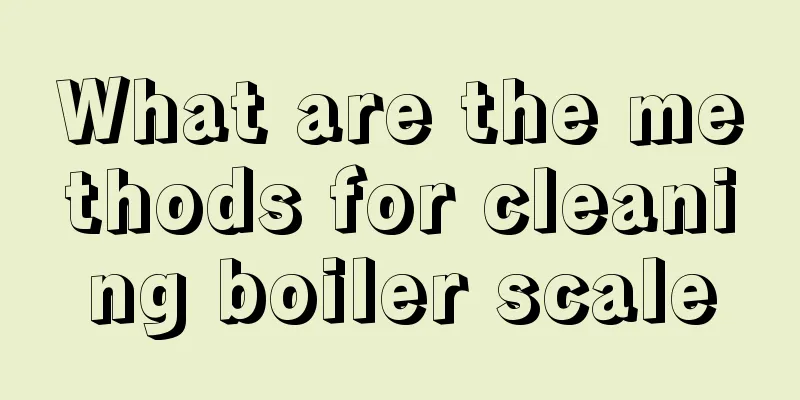What are the methods for cleaning boiler scale

|
Boilers play a very important role in our industry and play a big role in people's life and development. But we also know that boilers are also very dangerous. We often hear about boiler explosions causing injuries. The reason why boilers have such problems is largely related to the scale in the boiler. Therefore, it becomes very important to remove the scale in the boiler. Do you know how to clean boiler scale? How to remove boiler scale Boilers should be based on active anti-scaling and anti-corrosion. However, when boiler scaling or corrosion deposits reach a certain level, they should be cleaned and removed in time to avoid potential hazards to the safe operation of the boiler. The methods of boiler cleaning and descaling are mainly divided into two categories: mechanical descaling and chemical cleaning. Chemical cleaning can be divided into alkaline descaling and acid cleaning. The methods and requirements for boiler descaling are briefly introduced as follows: 1. Boiler Mechanical Descaling Mechanical descaling is mainly carried out using tools such as electric pipe cleaners, flat shovels, wire brushes and hand hammers. This method is relatively simple and low-cost, but it is labor-intensive, has poor descaling effect, and is easy to damage the metal surface. It is only suitable for small boilers with small scaling area and simple structure, which are easy for mechanical tools to contact the scale. In recent years, due to the application of high-pressure water guns specially used for cleaning, mechanical descaling by hydraulic flushing has developed rapidly. The effect of this high-pressure hydraulic descaling is greatly improved compared with the use of primitive mechanical tools, and it is safer and more convenient. but At present, high-pressure hydraulic descaling is still limited to industrial boilers with simpler structures. 2. Boiler Alkaline Cleaning (Boiler) Descaling The main function of boiler alkaline boiling is to transform scale and make it loose and fall off. The descaling effect of simple alkaline boiling is poor and often needs to be combined with mechanical descaling. Alkali boiling descaling has a certain effect on scale mainly composed of sulfate and silicate, but it is far less effective than acid washing descaling for carbonate scale. Alkali washing and boiling furnaces are also commonly used for rust removal and degreasing of newly installed boilers, and are sometimes also used for degreasing and cleaning or scale type conversion before pickling. The amount of alkaline cleaning agent should be determined according to the degree of scaling and dirtiness of the boiler. The general amount used for descaling (amount per ton of water) is: 5-10kg of industrial trisodium phosphate, 3-6kg of sodium carbonate, or 2-4kg of sodium hydroxide. These alkaline cleaning agents should first be prepared into a certain concentration in a solution tank, then pumped into the pot and circulated until uniform. The method of descaling by alkaline boiling is basically the same as that of boiling a new boiler, except that after the boiling is completed, the inspection holes of the boiler should be opened and mechanical (or high-pressure hydraulic) assisted descaling should be carried out in time to prevent the soft scale from hardening again. 3. Boiler pickling and descaling Among various descaling methods, pickling has the best descaling effect. However, if the pickling process is inappropriate or improperly controlled, it will affect the descaling effect or corrode the metal, and sometimes even seriously affect the safe operation of the boiler. In order to ensure the safety and quality of boiler pickling, the State Administration of Quality Supervision, Inspection and Quarantine has specially formulated and issued the "Boiler Chemical Cleaning Rules", which stipulates that units engaged in boiler chemical cleaning must obtain qualification approval from provincial and above boiler pressure vessel safety supervision agencies before they can undertake boiler chemical cleaning of the corresponding level. Any unit or individual (including boiler users) without corresponding qualifications may not pickle the boiler without authorization. Before pickling, representative scale samples should be taken from the boiler for testing and a cleaning plan should be formulated; corrosion indicator sheets should be hung in the boiler and the acid tank when the acid is added (until they are taken out when the acid is removed); the pickling process and the temperature, concentration, flow rate, and time of the pickling solution should be implemented and controlled according to the cleaning plan; sampling should be continuously taken for testing during the cleaning process and records should be kept truthfully. After cleaning is completed, the boiler user, cleaning unit and boiler safety supervision department shall inspect and accept the cleaning quality. The pickling quality requirements for industrial boilers are as follows: (1) Descaling rate (1) When cleaning scale mainly composed of carbonate scale, the descaling area should reach more than 80% of the original scale coverage area. (2) When cleaning silicate or sulfate scale, the descaling area should reach more than 60% of the original scale coverage area. If the descaling rate of the boiler is lower than the above requirements, or if the main heating surface of the boiler is still covered with scale that is difficult to clean even though it meets the specified requirements, the boiler should be operated for about a month while maintaining the alkalinity of the boiler water at the upper limit of the water quality standard, and then shut down, and the detached scale and residue should be cleaned manually or with a high-pressure water gun. Since the hard scale remaining after pickling is often loose, it will gradually fall off when the boiler is put into operation. If it is not cleaned again, accidents are very likely to occur. Therefore, when there is a lot of residual scale, it must be dealt with. (2) A good passivation protective film should be formed on the surface of the boiler after cleaning, and no secondary rust or pitting should appear on the metal surface. (3) The average corrosion rate of the metal measured by the corrosion indicator sheet should be less than 6g/(m2·h), and the total corrosion amount should not exceed 72g/m2. (4) After cleaning, all the water-cooled wall tubes, convection tubes and other furnace tubes in the boiler should flow smoothly. If a pipe is clogged before cleaning and still cannot flow smoothly after cleaning, it should be repaired or replaced by a qualified repair unit. What are the methods for cleaning boiler scale? After reading the introduction above, I believe everyone has some understanding of how to remove boiler scale, and also knows what methods can be used to remove scale and reduce the danger of the boiler. Scale has a great impact on the service life of the boiler, so everyone must pay attention to it. Factories should pay more attention to the regular cleaning of boilers, so that it can be safer. |
<<: How to clean scale on electric water heater
>>: How to clean scale from a water dispenser
Recommend
What is systolic blood pressure
The so-called systolic blood pressure refers to t...
Is pancreatic cancer a cancer caused by anger? Learn the real reason
Pancreatic cancer has always been called the king...
How to treat ichthyosis?
Ichthyosis is a hereditary skin disease, and it c...
What are the symptoms before death from nasopharyngeal cancer
What are the symptoms of nasopharyngeal cancer be...
How can thick fingers become thinner?
People have always paid great attention to protec...
How to wash nail polish off clothes, 6 tips
Women who love beauty always have strict requirem...
What is the best time to have dinner
You must not eat dinner too late, especially not ...
Is it good to take a shower during the day?
Taking a bath is something that everyone needs to...
How to prevent sacrococcygeal teratoma
By referring to the general tumor prevention meth...
What are the specific manifestations of breast cancer symptoms
Nowadays, breast cancer is a common disease among...
Is rectal cancer turning into lung cancer contagious?
Nowadays, there are still many people who believe...
Chlamydia positive
Summer is a period when pathogenic microorganisms...
What are the four main causes of frequent toothache?
Have you ever experienced toothache in your daily...
What are the early signs of gastric cancer? 3 symptoms are warning signs, the first one is most likely to be ignored
It is no exaggeration to say that nearly half of ...
What symptoms may indicate increased muscle tension in the limbs
Increased muscle tone in the limbs is more common...









